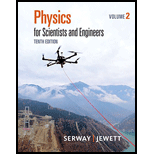
Physics for Scientists and Engineers, Volume 2
10th Edition
ISBN: 9781337553582
Author: Raymond A. Serway, John W. Jewett
Publisher: Cengage Learning
expand_more
expand_more
format_list_bulleted
Concept explainers
Question
Chapter 1, Problem 28P
(a)
To determine
The factor by which
(b)
To determine
The pattern of proportionality of
(c)
To determine
The quantities that should be plotted on the horizontal and vertical axis to display the above proportionality as a straight line on a graph,
(d)
To determine
The slope of the above graph.
Expert Solution & Answer
Trending nowThis is a popular solution!

Students have asked these similar questions
The cylindrical beam of a 12.7-mW laser is 0.920 cm in diameter. What is the rms value of the electric field?
V/m
Consider a rubber rod that has been rubbed with fur to give the rod a net negative charge, and a glass rod that has been rubbed with silk to give it a net positive charge. After being charged by contact by the fur and silk...?
a. Both rods have less mass
b. the rubber rod has more mass and the glass rod has less mass
c. both rods have more mass
d. the masses of both rods are unchanged
e. the rubber rod has less mass and the glass rod has mroe mass
8) 9)
Chapter 1 Solutions
Physics for Scientists and Engineers, Volume 2
Ch. 1.1 - In a machine shop, two cams are produced, one of...Ch. 1.3 - True or False: Dimensional analysis can give you...Ch. 1.4 - The distance between two cities is 100 mi. What is...Ch. 1 - Prob. 1PCh. 1 - Prob. 2PCh. 1 - Prob. 3PCh. 1 - Prob. 4PCh. 1 - You have been hired by the defense attorney as an...Ch. 1 - A surveyor measures the distance across a straight...Ch. 1 - A crystalline solid consists of atoms stacked up...
Ch. 1 - The position of a particle moving under uniform...Ch. 1 - Prob. 9PCh. 1 - (a) Assume the equation x = At3 + Bt describes the...Ch. 1 - A solid piece of lead has a mass of 23.94 g and a...Ch. 1 - Why is the following situation impossible? A...Ch. 1 - Prob. 13PCh. 1 - Let AI represent the density of aluminum and Fe...Ch. 1 - One gallon of paint (volume = 3.78 103 m3) covers...Ch. 1 - Prob. 16PCh. 1 - (a) Compute the order of magnitude of the mass of...Ch. 1 - To an order of magnitude, how many piano tuners...Ch. 1 - Your roommate is playing a video game from the...Ch. 1 - How many significant figures are in the following...Ch. 1 - The tropical year, the time interval from one...Ch. 1 - Prob. 22PCh. 1 - Review. In a community college parking lot, the...Ch. 1 - Prob. 24PCh. 1 - Review. The ratio of the number of sparrows...Ch. 1 - Review. Prove that one solution of the equation...Ch. 1 - Prob. 27PCh. 1 - Prob. 28PCh. 1 - Prob. 29APCh. 1 - (a) What is the order of magnitude of the number...Ch. 1 - The distance from the Sun to the nearest star is...Ch. 1 - Why is the following situation impossible? In an...Ch. 1 - Bacteria and other prokaryotes are found deep...Ch. 1 - A spherical shell has an outside radius of 2.60 cm...Ch. 1 - Air is blown into a spherical balloon so that,...Ch. 1 - In physics, it is important to use mathematical...Ch. 1 - The consumption of natural gas by a company...Ch. 1 - A woman wishing to know the height of a mountain...Ch. 1 - Prob. 39CP
Knowledge Booster
Learn more about
Need a deep-dive on the concept behind this application? Look no further. Learn more about this topic, physics and related others by exploring similar questions and additional content below.Similar questions
- Lab 8 Part 3 PHET Wave Interface simulation. I am having trouble with this part of the lab.arrow_forwardMick and Rick are twins born on Earth in the year 2175. Rick grows up to be an Earth-bound robotics technician while Mick becomes an intergalactic astronaut. Mick leaves the Earth on his first space mission in the year 2200 and travels, according to his clock, for 10 years at a speed of 0.75c. Unfortunately, at this point in his journey, the structure of his ship undergoes mechanical breakdown and the ship explodes. How old is Rick when his brother dies?arrow_forwardHi, I have canceled, why did you charge me again?arrow_forward
arrow_back_ios
SEE MORE QUESTIONS
arrow_forward_ios
Recommended textbooks for you
 Physics for Scientists and Engineers: Foundations...PhysicsISBN:9781133939146Author:Katz, Debora M.Publisher:Cengage Learning
Physics for Scientists and Engineers: Foundations...PhysicsISBN:9781133939146Author:Katz, Debora M.Publisher:Cengage Learning Physics for Scientists and EngineersPhysicsISBN:9781337553278Author:Raymond A. Serway, John W. JewettPublisher:Cengage Learning
Physics for Scientists and EngineersPhysicsISBN:9781337553278Author:Raymond A. Serway, John W. JewettPublisher:Cengage Learning Physics for Scientists and Engineers with Modern ...PhysicsISBN:9781337553292Author:Raymond A. Serway, John W. JewettPublisher:Cengage Learning
Physics for Scientists and Engineers with Modern ...PhysicsISBN:9781337553292Author:Raymond A. Serway, John W. JewettPublisher:Cengage Learning
 College PhysicsPhysicsISBN:9781938168000Author:Paul Peter Urone, Roger HinrichsPublisher:OpenStax College
College PhysicsPhysicsISBN:9781938168000Author:Paul Peter Urone, Roger HinrichsPublisher:OpenStax College Principles of Physics: A Calculus-Based TextPhysicsISBN:9781133104261Author:Raymond A. Serway, John W. JewettPublisher:Cengage Learning
Principles of Physics: A Calculus-Based TextPhysicsISBN:9781133104261Author:Raymond A. Serway, John W. JewettPublisher:Cengage Learning

Physics for Scientists and Engineers: Foundations...
Physics
ISBN:9781133939146
Author:Katz, Debora M.
Publisher:Cengage Learning

Physics for Scientists and Engineers
Physics
ISBN:9781337553278
Author:Raymond A. Serway, John W. Jewett
Publisher:Cengage Learning

Physics for Scientists and Engineers with Modern ...
Physics
ISBN:9781337553292
Author:Raymond A. Serway, John W. Jewett
Publisher:Cengage Learning


College Physics
Physics
ISBN:9781938168000
Author:Paul Peter Urone, Roger Hinrichs
Publisher:OpenStax College

Principles of Physics: A Calculus-Based Text
Physics
ISBN:9781133104261
Author:Raymond A. Serway, John W. Jewett
Publisher:Cengage Learning